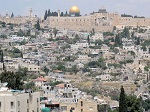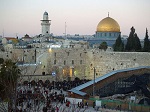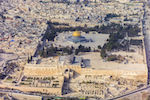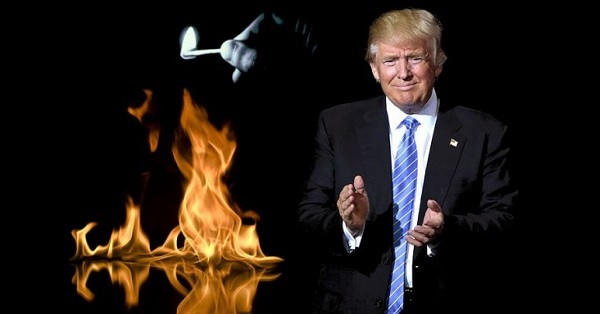 Americans for Peace Now strongly opposes any move by the Trump Administration to alter
longstanding US policy on Jerusalem outside the context of a peace agreement between Israel and the
Palestinians. Here is what you need to know:
Americans for Peace Now strongly opposes any move by the Trump Administration to alter
longstanding US policy on Jerusalem outside the context of a peace agreement between Israel and the
Palestinians. Here is what you need to know:
- 1. President Trump made a landmark announcement on Jerusalem on December 6th.
President Trump did two things in his speech: he reversed 70 years of American policy by recognizing Jerusalem as Israel’s capital and he announced plans to move the US embassy in Israel from Tel Aviv to Jerusalem.
- 2. Recognition of Jerusalem as Israel’s capital, without any acknowledgment of Palestinian claims to Jerusalem, is the root of the problem.
 Jerusalem is Israel’s capital. But the timing of international, and particularly American,
recognition of this matters – as do the particular borders of Jerusalem that are recognized. The reason is that
Palestinians also have legitimate claims to Jerusalem as the capital of their eventual state and any realistic
peace plan includes at least some portion of East Jerusalem as that capital.
Jerusalem is Israel’s capital. But the timing of international, and particularly American,
recognition of this matters – as do the particular borders of Jerusalem that are recognized. The reason is that
Palestinians also have legitimate claims to Jerusalem as the capital of their eventual state and any realistic
peace plan includes at least some portion of East Jerusalem as that capital.
Moving the US embassy to Jerusalem, in the absence of a peace agreement between Israel and the Palestinians, recognizes Israeli claims to Jerusalem while giving the Palestinians nothing. And timing matters. Trump’s impending announcement is occurring as Congress prepares to cut, through the Taylor Force Act, aid that would benefit the Palestinian Authority, and following Trump’s near-decision to close the PLO mission to Washington. (Since Trump's announcement, PA President Mahmoud Abbas recalled Palestinian diplomats in protest.) Adding to that, US recognition of Jerusalem as Israel’s capital and/or relocation of the US embassy creates a “triple whammy” against the Palestinians. It will severely damage American credibility as an honest broker of peace between Israelis and Palestinians, and in foreign policy more broadly. So much for President Trump’s avowed desire to make the “ultimate deal.”
- 3. Israel has diplomatic relations with 158 countries. None of them has embassies in Jerusalem.
 Thirteen countries maintained embassies in Jerusalem until 1980, when Israel’s Knesset passed a
law making all of Jerusalem – including the Eastern portion which it conquered in the 1967 war – the “complete
and united capital of Israel.” (Israel annexed the Western portion of Jerusalem in 1949.) The UN Security
Council condemned the move as a violation of international law and passed UNSC resolution 478 calling upon
member states to close their embassies in Jerusalem. All 13 countries with diplomatic missions there complied. Ever since the US established diplomatic
relations with Israel in 1949, its embassy has been located in Tel Aviv.
Thirteen countries maintained embassies in Jerusalem until 1980, when Israel’s Knesset passed a
law making all of Jerusalem – including the Eastern portion which it conquered in the 1967 war – the “complete
and united capital of Israel.” (Israel annexed the Western portion of Jerusalem in 1949.) The UN Security
Council condemned the move as a violation of international law and passed UNSC resolution 478 calling upon
member states to close their embassies in Jerusalem. All 13 countries with diplomatic missions there complied. Ever since the US established diplomatic
relations with Israel in 1949, its embassy has been located in Tel Aviv.
- 4. Americans, and particularly American Jews, do not want the US government to move our embassy to Jerusalem.
The numbers are striking. Among Americans, only 31 percent support immediate relocation of the US embassy to Jerusalem, while 63 percent support it. By party affiliation, opposition to the move is shared by 81 percent of Democrats, 60 percent of Independents, and 44 percent of Republicans. Among American Jews, opposition to the embassy move is even more pronounced than among the American population as a whole. Only 16 percent support an immediate move, while 36 percent would support the relocation in the context of progress in Israeli-Palestinian peace talks, and 44 percent oppose the move entirely.
- 5. Globally, opposition to President Trump’s impending moves on Jerusalem is overwhelming.
Palestinian Authority President Mahmoud Abbas condemned Trump's decision, stating that the US had withdrawn from its role as mediator between Palestinians and Israelis. Jordan and Egypt, American allies and the two Arab countries that have signed peace treaties with Israel, have lobbied against these moves. For Jordan, which faces the particularly high possibility of violence among the 70 percent of its population of Palestinian origin, Trump’s actions are particularly dangerous. Saudi Arabia has cautioned that changing the status quo would harm the peace process and inflame regional tensions. The Secretary-General of the Arab League has warned that American recognition of Jerusalem as Israel’s capital is likely to fuel violence. The potential for repercussions in the broader Muslim world are profound, given the centrality of Jerusalem (Al-Quds) to Muslims. The Organization of Islamic Cooperation warned against Trump’s upcoming moves and indicated that its 57 member-states could sever relations with the US as a result. Among America’s European allies, pressure on Trump to reverse his apparent course is strong, with Britain, Germany, France, the European Union, and others issuing reactions. As if that were not enough, former Israeli senior diplomats have written to Trump’s Middle East peace envoy Jason Greenblatt to warn against unilateral American recognition of Jerusalem as Israel’s capital.
- 6. That said, Trump prioritizes the interest of his political base, which has pressured him to follow through on his campaign promises.
Sheldon Adelson, billionaire casino mogul and a major donor to Donald Trump’s presidential campaign, reportedly has been furious over Trump’s failure to deliver on his campaign promise to move the embassy. Steve Bannon, Trump’s one-time White House advisor, urged Trump to make the change. US Ambassador to Israel David Friedman, a long-time supporter of Israeli settlements in the West Bank, has spoken longingly of moving the embassy. Some evangelical Christians have pushed hard for Trump to announce the move – though this evangelical sentiment on this issue is not universal. Israel’s Ambassador to the US Ron Dermer is a forceful advocate of the move. In May, Prime Minister Netanyahu argued that the US embassy should be in Jerusalem and fought back against claims that he has quietly worked behind the scenes to keep the US embassy in Tel Aviv to prevent bloodshed.
- 7. The potential for a two-state solution and the safety of Israelis, Palestinians, Americans in Israel, and American diplomats abroad are at stake.
Playing with Jerusalem is playing with fire. We saw that quite clearly during the Temple Mount crisis in July when violence flared in Jerusalem following a terrorist attack on Israeli police guarding the Mount and Prime Minister Netanyahu’s subsequent decision to change the status quo there by introducing metal detectors at the holy site. In the words of Haaretz’s David B. Green, “When it comes to Jerusalem, the changing of a light bulb in the Church of the Holy Sepulchre is the type of mundane task with the potential to explode into a new religious war.” The US Consulate in Jerusalem has already issued a security warning for American diplomats and citizens. Since Congress passed its 1995 law mandating that the US move its embassy to Jerusalem, four Democratic and Republican presidents (including Trump) have exercised prudence by issuing national security waivers every six months to defer the move. With Trump, however, it looks like caution and good judgment are about to give way to destructive impulses, pressure from Israel’s Right-wing government, and demands from his domestic political base. Fasten your seatbelts.
